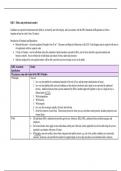SQE2 – Ethics and professional conduct
Candidates are required to demonstrate their ability to act honestly and with integrity, and in accordance with the SRA Standards and Regulations as follows
(together referred to as the Code of Conduct):
Introduction of Standards and Regulations:
Reduced Outcomes – focussed regulation: Principles from 10 to 7. Outcomes and Indicative Behaviours in the 2011 Code disappear and are replaced with one set
of requirements with two separate codes.
2 Codes of Conduct – one for individuals (describes standards of professionalism expected by SRA), one for firms (describes expected standards and
business controls). Focus on behaviour of individuals and culture of firms, rather than outcomes.
Solicitors employed by non-regulated entities will be able to provide non-reserved legal services to the public.
SQE2 Assessment Details
Specification
The purpose, scope and content of the SRA Principles
7 Principles You act:
1. In a way that upholds the constitutional principle of the rule of law, and the proper administration of justice.
2. In a way that upholds public trust and confidence in the solicitors' profession and in legal services provided by authorised
persons. Authorised person means a person authorised by SRA or another approved regulator to carry on a legal activity as
defined under s12 LSA.
3. With independence.
4. With honesty.
5. With integrity.
6. In a way that encourages equality, diversity and inclusion.
7. In the best interests of each client. Client means person for whom you act, and where context permits, includes prospective and
former clients.
Scope All individuals SRA is authorised to provide legal services: Solicitors, RELs, RFLs, authorised firms and their managers and
employees.
For licensed bodies, these apply to those individuals and the part of the body (where applicable) involved in delivering the services
regulated in accordance with terms of licence.
If Principles come into conflict, those which safeguard wider public interest (e.g. rule of law, public confidence in a trustworthy
solicitors’ profession, safe and effective market for regulated legal services) take precedence over individual client’s interests.
, The purpose, scope and content of the SRA Code of Conduct for Solicitors, RELs and RFLs
Purpose Describes the standards of professionalism that SRA, and the public expect of individuals (solicitors, registered European lawyers and
registered foreign lawyers) authorised by SRA to provide legal services.
Scope Apply to conduct and behaviour relating to practice, and comprise a framework for ethical and competent practice which applies
irrespective of role / environment / organisation in which you work (subject to the Overseas Rules which apply to practice overseas).
Paragraphs 8.1 to 8.11 apply only when you are providing your services to the public or a section of the public.
Breach Serious failure to meet standards or serious breach of regulatory requirements may result in regulatory action.
Failure / breach may be serious either in isolation or because it comprises a persistent / concerning pattern of behaviour.
Code of Conduct for Solicitors, RELs and RFLs
1. Maintaining trust and 1.1 You do not unfairly discriminate by allowing your personal views to affect your professional relationships and the way in which
acting fairly you provide your services.
1.2 You do not abuse your position by taking unfair advantage of clients or others.
1.3 You perform all undertakings given by you, and do so within an agreed timescale or if no timescale has been agreed then within a
reasonable amount of time.
- Undertakings: Statement given orally or in writing, whether or not it includes the word “undertake”/ “undertaking”, to
someone who reasonably places reliance on it, that you / 3P will do something / cause something to be done/ refrain from
doing something.
1.4 You do not mislead or attempt to mislead your clients, the Court or others, either by your own acts or omissions or allowing or
being complicit in the acts or omissions of others (including your client).
2. Dispute resolution and 2.1 You do not misuse or tamper with evidence or attempt to do so.
proceedings before Courts, 2.2 You do not seek to influence the substance of evidence, including generating false evidence / persuading witnesses to change
tribunals and inquiries their evidence.
2.3 You do not provide / offer to provide any benefit to witnesses dependent upon the nature of their evidence / outcome of the case.
2.4 You only make assertions / put forward statements, representations / submissions to the Court or others which are properly
arguable.
2.5 You do not place yourself in contempt of Court, and you comply with Court orders which place obligations on you.
2.6 You do not waste the Court's time.
2.7 You draw the Court's attention to relevant cases and statutory provisions, or procedural irregularities of which you are aware, and
which are likely to have a material effect on the outcome of the proceedings.
3. Service and competence 3.1 You only act for clients on instructions from the client, or from someone properly authorised to provide instructions on their
behalf. If you have reason to suspect that the instructions do not represent your client's wishes, you do not act unless you have
satisfied yourself that they do. However, in circumstances where you have legal authority to act notwithstanding that it is not
possible to obtain or ascertain the instructions of your client, then you are subject to the overriding obligation to protect your client's
best interests.




